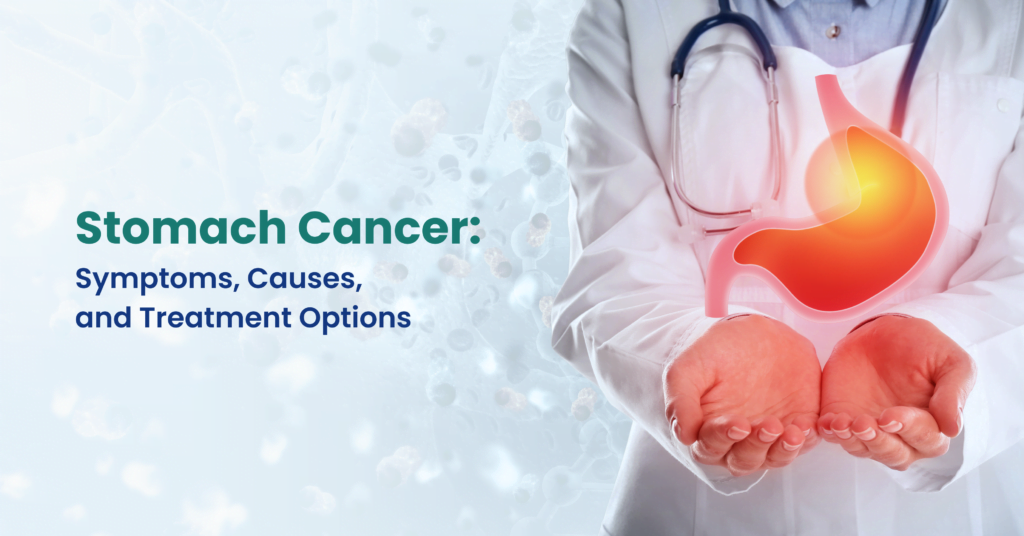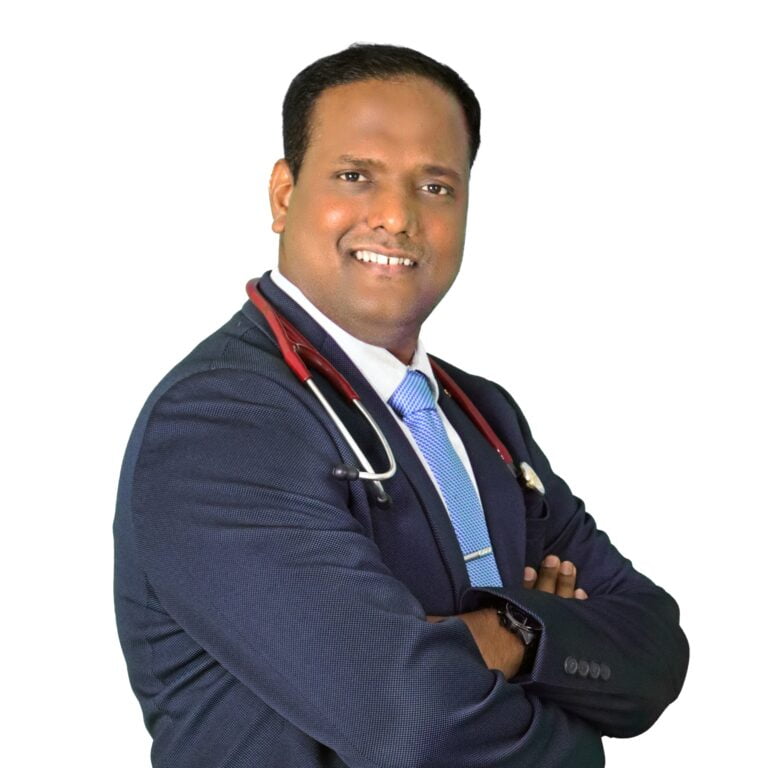Stomach Cancer: Symptoms, Causes, and Treatment Options

Table of Contents
Gastric cancer, also known as stomach cancer, is one of the worst cancers. It is associated with a huge burden on global health, affecting hundreds of thousands of people annually. Although medical advances have managed to improve the diagnosis and management of this disease, the proper management of stomach cancer will be improved if one gets a proper understanding of the disease. Let’s explore all the symptoms, risk factors, diagnosis, and treatment approaches of stomach cancer in this article.
What is stomach cancer?
Stomach cancer is the result of abnormal cells within the stomach that start growing and replicating in an uncontrolled manner into a tumor. Most of the tumors, however, are revealed to have metastasized into neighboring lymph nodes and other organs. As such, early detection and intervention are very important. Though the exact cause of stomach cancer is not known, there are a number of factors that can increase the chances of a person getting this disease.
What are the symptoms of stomach cancer?
Stomach cancer symptoms are very unspecific and may be mistaken for other gastrointestinal disorders. The most common symptoms and signs include:
- Persistent pain or discomfort in the abdomen
- Loss of appetite
- Loss of appetite
- Inability to swallow
- Nausea and vomiting
- Feelings of fullness quickly after eating a small meal
- Fatigue and weakness
Blood in the stool or in the vomit, which may appear black and tarry.
Don't ignore persistent symptoms as mere stomach problems—they could signal stomach cancer. Take action today and get tested for peace of mind.
What are the risk factors for stomach cancer?
There are several factors that can increase the risk of stomach cancer in individuals. These include:
- Helicobacter pylori infection: This bacterium, Helicobacter pylori, causes chronic infection that results in stomach inflammation (gastritis) and peptic ulcers. Chronic inflammation may predispose the lining of the stomach to cancerous changes.
- Family history: There is an increased risk for stomach cancer among patients with a family history of the disease. There is a possibility that the disease is genetically predisposed.
- Diet: High-salted, smoked, or pickled diets may increase the risk of developing stomach cancer. Diets high in fruits and vegetables may be protective.
- Tobacco and alcohol use: Smoking and heavy alcohol use are associated with an increased risk of stomach cancer.
- Previous stomach surgery: A previous partial gastrectomy increases the risk of developing stomach cancer.
How is stomach cancer diagnosed?
Stomach cancer will be diagnosed by the combination of a number of factors, including:
- Review of the medical history: This may include the history of the patient and his or her signs and symptoms.
- Physical examination: it will involve a full abdominal and upper gastrointestinal tract examination.
Diagnostic tests: these may include: - Endoscopy: This involves passing a slender, flexible tube with a connected camera at the tip, through the oral cavity, via the esophagus, into the stomach in order to see any abnormal areas and take tissue samples using a biopsy.
- Imaging tests: These may include computed tomography (CT) scans, magnetic resonance imaging (MRI), and positron emission tomography (PET) scans in order to investigate the size of the tumour and if it has spread or not.
- Laboratory tests: These may include blood tests looking at specific marker levels, such as those of carcinoembryonic antigen (CEA) and cancer antigen 19-9 (CA 19-9), which are elevated in patients with stomach cancer.
How can stomach cancer be treated?
Stomach cancer treatment options are varied depending on a number of factors, including the patient’s stage of disease, the location and size of the tumor, and the patient’s general health condition. The most common treatment modalities include:
- Surgery: This will include the surgical removal of the tumor, which can be a partial or total gastrectomy, combined with the removal of nearby lymph nodes to prevent spread.
- Chemotherapy: Chemotherapy involves the use of powerful drugs to kill or slow the growth of cancer cells. It may be used before surgery (neoadjuvant chemotherapy) to shrink the tumor or after surgery (adjuvant chemotherapy) to eradicate any remaining cancer cells.
- Radiation therapy: Radiation therapy uses very high energy beams to target and destroy cancer cells. It may be used in isolation or in combination with surgery and chemotherapy.
- Targeted therapy: These drugs specifically target molecules or pathways that are involved in the growth and progression of cancer. It will be combined with other therapies or used in isolation as a treatment option for some types of stomach cancer.
- Immunotherapy: It harnesses the power of the body’s own immune system to recognize and combat cancer cells. This is still relatively new to stomach cancer, but immunotherapy drugs are being researched in clinical trials, showing promising results for certain patient types.
What can we expect after treatment for stomach cancer?
The prognosis of stomach cancer depends on the stage of the disease, the response to treatment, and the patient’s general health status. In the case of timely and aggressive management of cancer, chances for successful outcomes become the greatest. However, stomach cancer is usually in an advanced stage at the time of detection.
Can stomach cancer be prevented?
Stomach cancer is not completely preventable, but if one sticks to a few suggested healthy changes in lifestyle and preventive measures, that will help reduce the chances. Some of them include:
- Quitting the use of tobacco and limiting alcohol intake as much as possible
- Diet rich in fruits, vegetables, and whole grains and without processed and salted foods
- Prompt treatment of a Helicobacter pylori infection with antibiotics, if detected
- Healthy weight and regular physical activity
- Regular screening tests and early medical attention are needed for symptoms that do not subside
Breakthroughs in Stomach Cancer Clinical Research
Stomach cancer is now being treated from various fronts, including chemoprevention, staging, and innovative therapies, whereas studies are investigating antioxidants and antibiotics to reduce the risk of stomach cancer in its development and recurrence, offering the hope of preventive strategies. Promising is the sentinel lymph node biopsy, which promises precise staging and targeted treatment planning.
The surgical approach, which is only refined, includes laparoscopic approaches that seek to improve patient outcome and recovery. The underlying aim of chemotherapy is still valid, and ongoing research is investigating new drugs, like S-1, alternative drug delivery, and the added regimen in such a way that the efficacy is increased and the toxicity is minimized. The existence of targeted therapy drugs, which, like HER2 and VEGF receptors, are meant to be targeted, offers tailored treatment options. Immunotherapy, although initially limited to the most advanced forms, has gained much interest with such a drug as pembrolizumab, wherein a combination therapy is being developed to have much better efficacy.
Continued research in such areas promises to transform stomach cancer management into good patients’ outcomes.
Conclusion:
Stomach cancer is one of the most serious diseases, with very serious consequences for patients and their families. Knowing what the risk factors, symptoms, and available treatment options are is of the utmost importance when taking proactive steps. In addition, seeking early medical attention to symptoms that may persist and avoiding bad habits, dietary measures, maintaining a regular weight, and participating in physical activity will not only prevent them from getting the disease but also encourage them to seek early treatment if needed. More effective diagnosis, improved early detection methods, and advanced treatment options are of great importance for a brighter future in the fight against stomach cancer.
References:
About Author
Dr. A. Venugopal
MD (General Medicine), DM (Medical Oncology), MRCP – SCE Medical Oncology (UK), ECMO (Switzerland).
Dr A. Venugopal is One of the best medical oncologist and Hemato Oncologist in hyderabad, currently serving as the Head of the Department and Senior Medical Oncologist, Hemato Oncologist at Pi Health Cancer Hospital in Gachibowli, Hyderabad. He brings over 15 years of extensive experience in the field of Oncology.

